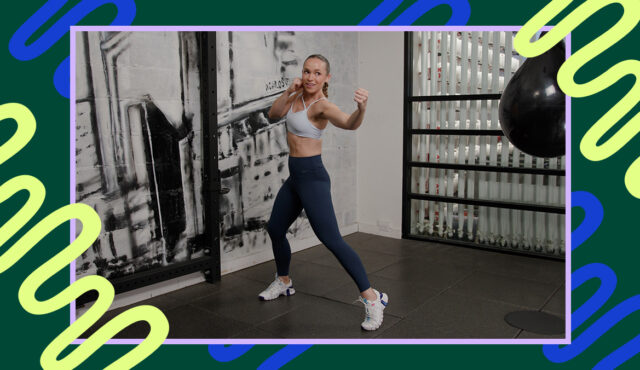Just like Rocky Balboa, you too can go from zero to hero with our 4-week boxing challenge—prepare to train, sweat, and succeed thanks to a program designed to get beginners ready to rumble.
Our host Bobbie Jo Davis, CPT, trainer for Rumble Boxing, will guide you through everything you need to know to jab, cross, and hook like a pro.
“I designed the program with everybody in mind,” Davis says. “From someone who has never thrown a punch before in their life, maybe brand new to fitness, to someone who’s a bit more advanced and can come to this and hone in on boxing while getting a great sweat.”
Experts In This Article
- Bobbie Jo Davis, CPT, NASM-certified personal trainer, coach at Rumble Boxing in NYC, and Nike trainer
And everything can be done either with or without a bag (though you will need a set of dumbbells for a few of the workouts).
Below, Davis has outlined a monthlong boxing program as part of our Movement of the Month Club for August 2024. It’s designed to introduce you to the fundamentals of boxing, and then progressively build your skills and confidence. We start on Monday, August 5.
By the end of the month, you’ll have the tools and techniques of a seasoned boxer. Whether you’re shadow boxing or punching a bag, get ready to feel the thrill of the fight and see real results.
“I’m hoping everyone will come through of this feeling more confident in themselves and their ability to move,” Davis says.
Join us for the benefits of boxing
The benefits of boxing go beyond the cathartic feeling of throwing punches; it’s a cardio and strength workout that benefits both body and mind.
“Boxing is one of the best workouts dynamically in the sense that you are moving in so many different ways,” Davis says. “From throwing quick jabs, to power uppercuts, ducking and weaving with defense, it’s a surefire way to hike up your heart rate and leave you feeling sweaty and powerful.”
A July 2013 study1 in the Journal of Sports Science and Medicine found that regular boxing training significantly improves heart rate variability, a key marker of cardiovascular efficiency. Other research has found2 that high-intensity boxing may improve some health markers, like blood pressure, more than brisk walking.
Boxing demands mental acuity and strategizing skills, helping to sharpen cognitive function, improve concentration, reduces stress, and enhances mental well-being. it’s also a boon to your brain: Boxing promotes better hand-eye coordination and increases agility, as athletes must constantly react to changing scenarios, improving neural adaptability and reaction times.
“[Boxing] benefits not only hand-eye coordination but also your mentality,” Davis says. “Learning patience, diligence, and using breath to help control stress.”
How the boxing challenge works
Starting Monday, August 5, 2024, you’ll have 3 rounds of boxing combos or strength exercises to do each day, Monday through Saturday. Then, on Sunday, you’ll finish the week with a 20-minute boxing workout that incorporates all the moves from the previous 6 days.
Each week, you’ll tackle different combinations of punches and exercises that perfect your technique, increase your stamina, and encourage mental toughness. Here’s what you can expect:
Week 1
- Jab + footwork
- Jab + cross
- Hook combo
- Uppercut combo
- 3-punch combo
- Endurance + defense
- Shadow Box Shuffle Workout
Week 2
- Boxing warmup
- Punch, bounce, duck
- HIIT punches
- Squat to alternating press
- Row to hammer curl
- Reverse lunge + punches
- Boxing Blitz and Build Workout
Week 3
- Boxing warmup
- Jack + jab
- Hook + duck
- Uppercut + duck combo
- Plank walkout with knee drive
- Jab, cross, plank jack
- Hook and Hustle Workout
Week 4
- Plank walkout with shoulder taps
- Hooks + knee drive
- Jab, cross, squat
- Supported side plank leg raise
- Split squat shuffle
- Reverse lunge + power jacks
- Feel Good Fight Workout
“Don’t look at boxing as one big challenge. Take it brick by brick,” Davis says. “Learn the basics, and be okay with making mistakes, a lot of mistakes. Use that to grow!”
Calendar for the boxing challenge

Get a printer-friendly version of the calendar here.
How to join the Movement of the Month Club
1. Print and/or save your calendar
Print out the calendar above or save it to your phone and use it each day to help you stay on track. Do each day’s exercise (or workout), then check off that box when you’re finished.
2. Join the club on Facebook
Our community of nearly 60,000 members (and growing!) is here to support and motivate you through the month. Tell the group how the day’s routine went, post photos or videos of your workouts or share your favorite boxing-related meme or motivational quote.
3. Learn to stand and throw punches
Here are descriptions for each of the punches you’ll be throwing in these workouts. First, you need to know how to stand properly:
- Stand with your feet shoulder-width apart with the non-dominant foot (if you’re right-handed, this would be your left foot) slightly forward. The back foot should be at a 45-degree angle to give stability and allow for movement.
- Keep your knees slightly bent to help generate power.
- Square your hips to your opponent (imaginary or real), aligning them with your shoulders.
- Tuck your elbows close to your body to protect your ribs from body shots.
- Raise your lead hand should be slightly forward, ready to jab, while your rear hand guards the side of your face.
- Tuck your chin slightly toward your chest.
- Balance your weight evenly on both legs or slightly more on the back leg.
Next, learn each of the punches. There are names, as well as numbers (in parentheses), which most boxing coaches use during workout to call out the punch you should throw.
- Jab (1): Extend your front hand quickly straight forward from your chin, rotating your fist to have your palm facing down just before impact, then swiftly pull it back.
- Cross (2): Throw a straight punch with your rear hand, pivoting on your back foot and rotating your hip and shoulder forward, palm facing down on impact.
- Front-hand hook (3): Rotate your front arm in a horizontal arc, leading with your elbow and turning your front foot and hip as you strike, fist parallel to the ground.
- Rear-hand hook (4): Pivot on your back foot and swing your arm in a tight curve, using your hip rotation to add force with your fist parallel to the floor.
- Front-hand uppercut (5): Drop your front hand slightly and drive it upward in a sharp, vertical line, rotating your front hip to add momentum.
- Rear-hand uppercut (6): Bend your knees slightly, then thrust upward with your rear hand, rotating your rear hip as you drive your fist in an upward arc toward the target.
You may also need to know these defensive moves:
- Duck: Bend your knees and lower your body quickly to evade an incoming punch.
- Roll: Bend your knees and rotate your upper body along a horizontal line, shifting your weight from one leg to the other and moving your head and shoulders in a circular motion to dodge punches.
4. Start your jabs, crosses, and hooks
On Day 1, you’ll start by working on your jabs and foot work. Check back here on August 5 for your full Week 1 moves and the workout that combines them all.
5. Celebrate your success!
You made it to the end! Take some time to appreciate that accomplishment—and let us know how it went in our Facebook group.
Well+Good articles reference scientific, reliable, recent, robust studies to back up the information we share. You can trust us along your wellness journey.
-
de Lira, Claudio Andre Barbosa et al. “Heart rate response during a simulated Olympic boxing match is predominantly above ventilatory threshold 2: a cross sectional study.” Open access journal of sports medicine vol. 4 175-82. 10 Jul. 2013, doi:10.2147/OAJSM.S44807 -
Cheema, Birinder S et al. “The feasibility and effectiveness of high-intensity boxing training versus moderate-intensity brisk walking in adults with abdominal obesity: a pilot study.” BMC sports science, medicine & rehabilitation vol. 7 3. 16 Jan. 2015, doi:10.1186/2052-1847-7-3









